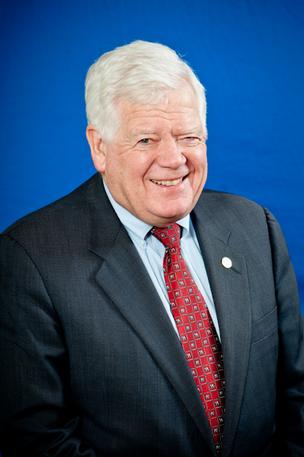Issue #99
The State
Vancouver oil terminal plan draws some green star power

The proposal to build the largest oil terminal in the Pacific Northwest at the Port of Vancouver is no mere local controversy. Nationally known environmental activist Bill McKibben’s decision to tour the Columbia River Wednesday morning put an exclamation point on that. Organized by Columbia Riverkeeper, the boat tour launched at Marine Park and headed for the site where Tesoro Corp. and Savage Companies want to build a crude oil facility that could handle 380,000 barrels of crude per day. The oil would eventually be refined into fuel for cars and trucks. And that’s exactly the problem, according to McKibben. He sees the Tesoro-Savage proposal — and numerous other oil- and coal-handling plans in the Northwest and across the country — as presenting a grave problem for a planet that’s already in trouble. “It pushes us much further into the greenhouse world,” said McKibben, founder of 350.org, a global grass-roots movement to fight climate change. “That’s more carbon, and more carbon is the last thing we need.” Vancouver Columbian, 7-17-13.
Striking berry pickers return to work in Skagit County

More than 150 farmworkers at Sakuma Farms in Burlington have returned to work picking berries, for now. The workers walked off the job last week demanding better wages and treatment by bosses. Negotiations between the strike committee and farm management are still ongoing. “There may be another work stoppage if negotiations halt,” says Tomas Madrigal, a farmworker organizer from Communidad a Communidad based in Bellingham. With ripe strawberries going unharvested, the workers agreed to return to the fields after winning further concessions from management. Steve Sakuma, the co-owner, has agreed to pay the pickers $3.75 per flat instead of a mere 30 cents per pound, a rate that made it nearly impossible to earn the minimum wage. “The workers were not thrilled, because it was still a low piece rate,” Madrigal says. Future piece rates, however, will be negotiated with three representatives of the berry pickers. The farmworkers can opt out of picking certain fields if they decide the piece rate is too low. The Stranger, 7-17-13.
Initiative season a big yawn so far—no big money (yet) against GMO measure, ‘initiative on initiatives’

Some of the heaviest hitters in town are lining up against Tim Eyman’s ‘initiative on initiatives,’ a measure that would make it easier to gather signatures and qualify initiatives for the ballot. But it’s not shaping up as much of a show, unless you think an $8,000 campaign budget is a big deal. Meanwhile, a food-labeling initiative, fresh from the Golden State, holds the potential to become a multimillion-dollar extravaganza. Organic-food merchants and activists are dumping gobs of money into the ballot measure, pretty much what you expect at this point, a little over $2 million. But there’s something strange going on there, too. The industry side is really the one to watch, and last month opponents didn’t raise a nickel. Washington State Wire, 7-15-13.
State budget not as austere as expected, say advocates for social services

Legislators cut $20 million in funding for the next biennium from Washington state’s Housing and Essential Needs (HEN) program, but housing advocates are still calling it a win. With nearly $1 billion needed for education, social service advocates were prepared for the worst this session, particularly for HEN, a state program that provides poor people with housing vouchers and household items such as toothpaste and dish soap. The $64 million program was poised to get slashed in half this session, but due to low usage it lost just $20 million. The clients who use the program now will be able to continue receiving the same services, said Michele Thomas, policy director for the Washington Low Income Housing Alliance. “That’s a tremendous shift from what the Senate was originally demanding,” Thomas said. “We consider it an incredible victory.” Real Change, 7-17-13.
King County
SeaTac Good Jobs Initiative hearing draws standing-room-only crowd; businesses roll out the big guns and pet media to oppose it

This small city of 27,000 has become the most important battleground this year in a national fight by labor interests for a $15-an-hour minimum wage, paid sick leave, and other rules. Odds are such proposals would never stand a chance in a typical state legislature, but by fighting city by city, in selected locations where local sympathies tip the scales, labor has scored big victories. They have come in places like Seattle, Los Angeles, San Francisco, and Long Beach. The SeaTac initiative is the most sweeping proposal yet, and it is a big worry for business, says Bruce Beckett of the state restaurant group. The matter has left the city’s business community in an uproar. A town-hall meeting on the matter in the city of SeaTac Tuesday night drew a standing-room-only audience, and local business interests announced they are forming an opposition group, Common Sense SeaTac. Washington State Wire, 7-18-13.
Sonics fans put on full-court press for McGinn; will it help?
It’s often been written that you don’t win elections without coalitions. Seattle Mayor Mike McGinn proved it in 2009 by uniting cycling lefty environmentalists with anti-tunnel types to claim victory. And as the 2013 mayoral primary nears, perhaps an even more unlikely coalition is coming together for the incumbent. Could Sonics fans and arena supporters help push McGinn through the primary? With King County Elections predicting a 35-percent voter turnout in Seattle, the chances may be better than you think. Of Seattle’s roughly 405,000 voters, 35-percent are actually expected to vote—or roughly 141,000. Given the crowded mayoral field, most political experts predict it will take about 25 percent of the vote to squeak through the primary—meaning the goal for McGinn and every other candidate in the field is about 35,000 votes. Given this math, it seem reasonable to say a few thousand basketball fans could have a direct impact on the race. Seattle Weekly, 7-17-13.
‘Hard-stripe’ sergeant hires meet SPD reform milestone

Mayor Mike McGinn surrounded himself with newly minted Seattle police sergeants Tuesday afternoon and announced the department has met a reform milestone with the creation of new internal academies to train its supervisors. The mayor also announced that Interim Chief Jim Pugel will undertake a feasibility study to determine whether the Seattle Police Department (SPD) wants to withdraw from the state academy and open a basic training academy of its own. McGinn and Pugel introduced 11 new “hard-stripe” sergeants, who replace acting sergeants in response to the conclusion by the Department of Justice (DOJ) that the department’s failure to properly supervise its officers is a core cause of the SPD’s problems with illegal use of force. Those new sergeants will also make up the first class of a new “Sergeants Academy,” with an 80-hour leadership curriculum, which McGinn said eventually will be attended by every sergeant on the force. Seattle Times, 7-16-13.
The Nation
GOP House votes to delay two requirements of health care bill; move is called ‘political stunt’; Obama threatens veto
Defying a veto threat from President Obama, the House Wednesday passed bills delaying two crucial parts of his health care overhaul that require most Americans to have insurance and many employers to offer it. The House Democratic leader, Nancy Pelosi of California, said the debate on Wednesday was a political stunt, a futile effort to reopen an issue that “has been settled in Congress, at the Supreme Court and at the ballot box.” Insurance companies oppose a delay of the individual mandate, which is, in essence, a requirement that people buy their products. New York Times, 7-17-13.
McDermott: We need the individual health insurance mandate

Representative Jim McDermott, (D-WA-7) came down hard on his Republican counterparts Wednesday, accusing them of playing politics in the ongoing debate on the delayed employer mandate to provide employees with health insurance. McDermott said that for Obamacare to succeed, the individual mandate must stick. “It seems (Republicans) have discovered in themselves a repressed populism they reserve for the special occasions when it serves their no-tax, no-regulation agenda,” McDermott said in his opening statement at a hearing on the employer mandate before the House Ways and Means Committee’s subcommittee on health. He is the top Democrat on the subcommittee. McDermott said taking away the mandate requiring individuals to sign up for health coverage would be disastrous. “Guaranteed insurance coverage without a mandate isn’t insurance at all,” he said. “It’s just elective bill payment. Given the opportunity, who wouldn’t put off paying for insurance until they need to use it if they could get it at any time?” Puget Sound Business Journal, 7-17-13.
State readying to sign up 1 million uninsured

The hundred-plus people who showed up at Tuesday’s “coverage is here” event — meant to kick off the effort to sign up uninsured Washington residents for health insurance through a new federal law — were one enthusiastic bunch. At a meeting room in downtown Seattle, they stood to cheer as Gov. Jay Inslee, a key Affordable Care Act advocate, took the podium, and they listened raptly as speakers from various health agencies and nonprofits detailed their best ideas for signing up the uninsured. They’ll advertise at sports events and on buses, and have information available at libraries and hospital emergency rooms. They’re training legions of people to help assist those who need insurance — in their own languages and with cultural sensitivity. Washington is ahead of most states in its effort to get ready, but for the people in this room — those on the ground, in counties large and small — Oct. 1 suddenly has become very near and the challenges very real. Seattle Times, 7-17-13.
Op-ed: Obamacare is the right’s worst nightmare
News from New York: It looks as if insurance premiums on the individual market are going to plunge thanks to Obamacare. This shouldn’t come as a surprise; in fact, the New York experience perfectly illustrates why Obamacare had to look the way it does. And it also illustrates why conservatives should be terrified about this legislation, as it takes effect. Americans may have had a lot of misgivings in advance, thanks to vast, deliberately spread misinformation. But unless the GOP finds even more ways to sabotage the plan, this thing is going to work, it’s going to be extremely popular, and it’s going to wreak havoc with conservative ideology. Although a few people will be hurt — young, healthy individuals too affluent to qualify for subsidies, wealthy taxpayers, etc. — a much larger number of people will be helped, some of them enormously. Paul Krugman, New York Times, 7-17-13.
At long last, Alpine Lakes bill gets House hearing

A House Natural Resources subcommittee will at long last hear testimony on legislation to expand the Alpine Lakes Wilderness and protect the Middle Fork-Snoqualmie River in eastern King County, after more than two years in which a Republican-run House has ignored legislation sponsored by a Republican congressman. The Public Lands Subcommittee will, on Tuesday, take up the Alpine Lakes bill along with legislation by Reps. Suzan DelBene (D-WA-1) and Rick Larsen (D-WA-2), to prevent removal of a historic lookout from the 6,500-foot summit of Green Mountain in Snohomish County. Rep. Dave Reichert (R-WA-8) has sought since 2007 to protect about 22,000 acres — mostly the wild Pratt River — to the Alpine Lakes Wilderness. The Middle Fork-Snoqualmie, proposed for designation under the Wild and Scenic Rivers Act, is the closest Cascade mountain valley to Seattle. Why hasn’t he? Because Rep. Doc Hastings (R-WA-4) wouldn’t allow a hearing. That has changed. Seattle P-I, 7-17-13.
Study finds police are recording license plates by the millions in a dragnet with few rules
You can drive, but you can’t hide. A rapidly growing network of police cameras is capturing, storing and sharing data on license plates, making it possible to stitch together people’s movements whether they are stuck in a commute, making tracks to the beach, or up to no good. For the first time, the number of license tag captures has reached the millions, according to a study published Wednesday by the American Civil Liberties Union based on information from hundreds of law enforcement agencies. Departments keep the records for weeks or years, sometimes indefinitely, saying they can be crucial in tracking suspicious cars, aiding drug busts, finding abducted children, and more. Attached to police cars, bridges or buildings — and sometimes merely as an app on a police officer’s smartphone — scanners capture images of passing or parked vehicles and pinpoint their locations, uploading that information into police databases. Associated Press (Minneapolis Star-Tribune), 7-17-13.
Liz Cheney’s fatal career move? She’s no shoo-in in Wyoming

She can count on the deep pockets and influential media platforms of her father’s friends in Washington. As for winning over Wyoming voters — well, Liz Cheney will have her work cut out for her. The former vice president’s daughter set tongues wagging Tuesday when she announced she will challenge incumbent Sen. Mike Enzi in a Republican primary, setting the stage for the marquee intraparty battle of 2014. There is agreement among the political class that, while the father remains very popular overall among likely primary voters, the daughter can’t be certain that appeal will transfer to her. Former Wyoming GOP Sen. Alan Simpson told the New York Times earlier this month that Cheney running would be a “disaster” and open the door for a Democrat to win the seat. But he took a more measured tone when reached by Politico Tuesday afternoon. “These are two very dear friends, and I don’t have anything more to say,” he said. Politico, 7-16-13.
To Think About
Thawing the Senate’s ‘deep freeze’
For all the railing against dysfunction in the nation’s capital, very little actually happened to overcome it — until this week. That’s why the agreement to begin putting an end to Senate filibusters of presidential nominees is a very big deal. It is an acknowledgment that the only way to stop political bullying is to confront the bully. On its face, the accord allowing seven of President Obama’s executive-branch nominees to gain confirmation without having to reach 60 votes would seem to be a climb-down by Democrats. They shelved plans to change the Senate rules and to bar filibusters of the president’s appointments to agency and Cabinet jobs. But this understates the magnitude of the victory. Senate Republican leader Mitch McConnell would have let the nominees through only if the Democrats promised not to alter the rules for the rest of this Congress. Yet such a capitulation would have opened the way for future filibusters. E.J. Dionne, Washington Post, 7-17-13.
